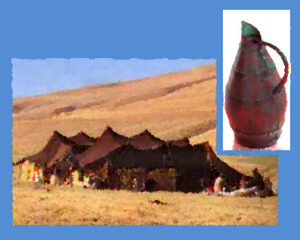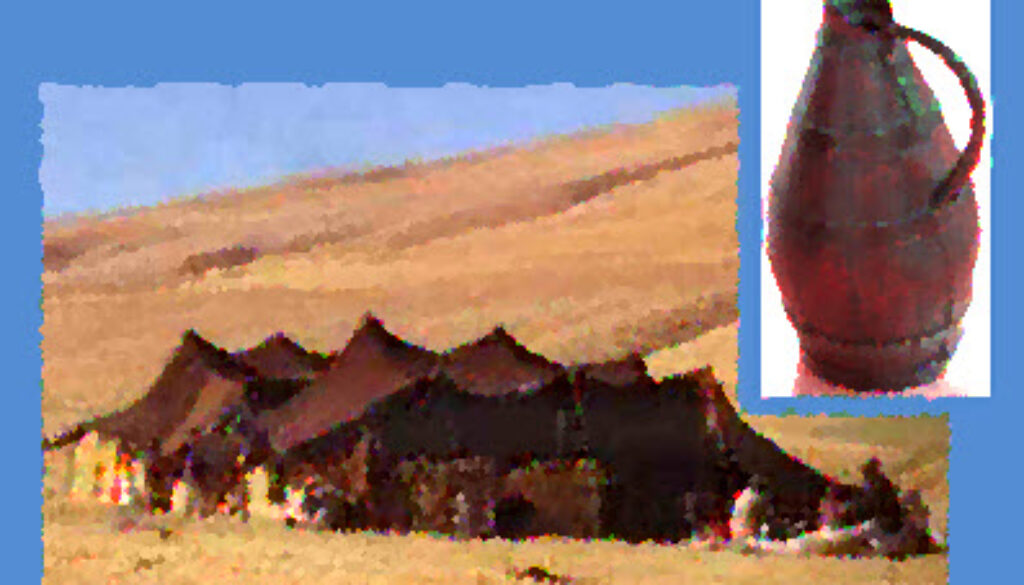Jeremiah 35:1-19 Rechabites

God calls Jeremiah to invite the Rechabites to a side room in the Temple and offer them wine to drink. They come but refuse to drink because they are honoring their ancestors.
To start with, I wanted to know who the Rechabites were. I found an answer from my favorite searching site; GotQuestions.org. I also wanted to know how they tied into Judah. 2 Kings 10 tells that story. Thankfully, I was pointed in that direction by my favorite searching site.
Don’t ask me to back up the information all the way back because I’m NOT a bible scholar. What I will do is stand with the scholars who I trust in their studies. That being said, the Rechabites were from Midian and an in-law relationship to Moses. We know that Moses’ father-in-law, Jethro, worshiped the Lord, even though he wasn’t an Israelite. Apparently, his son’s sons were too. I don’t know how many generations came between Jethro and Rechab but one of Rechab’s descendants, Jehonadab, helps Jehu destroy King Ahab’s house. We aren’t told exactly what Jehonadab’s role was after joining Jehu, but his life seemed to be marked by this encounter.
I say this because Jehonadab made his family swear to certain practices for their lives, their son’s lives and for every generation thereafter. Which brings us to our reading today in Jeremiah.
Over 200 years have passed since the days of Jehonadab, yet his descendants STILL follow his dictates. Talk about a family legacy! We see a family that is nomadic in nature. I would say they are probably shepherds of some kind and follow the seasons in their travels. They live in the territory of Judah; or at least they do at the time Jeremiah sent for them. I also believe they honor the Lord, even though they are not Israelites. When they are called by Jeremiah to the Temple, they were living in Jerusalem. And I bet they were still in their tents.
The requirements of this family sounded strange to me at first. I get the ‘drink no wine’ constraint as I don’t even like the smell of alcohol. And I CERTAINLY don’t like the effect it has on people. Maybe this effect is why Jehonadab swore his family to abstinence. He probably saw men ruined by the drink and he would do EVERYTHING in his power to ensure that this was not his family’s fate; for forever if he had anything to say about it. No wine means no drunkenness and no drunken foolishness.
But WHY did he command him to live in tents instead of houses? Was he afraid they would get too attacked to them? Having a fixed home requires you to care for it and invest your time in the community around it. Not planting or plowing goes perfectly with tent living. If you are always moving from one place to another, there is no time to care for a garden or fields. Which is why I figure that they are shepherds.
Whatever their mode of supporting themselves was, the MOST IMPORTANT aspects of their lives was their unity and devotion to their family’s values. It didn’t matter what others were doing around them. They didn’t try to change their neighbors, only maintain their own standards. And anyone who joined the family by birth or by marriage, was expected to adhere to the same family values. NO exceptions. “If you want to be part of us, you will do as we do without complaint or deviation. Those not willing to do so need not apply.”
God raised this family as an example for Judah. Not to follow in their footsteps, but as an example of a faithful people. This group was faithful to a promise their ancestors made to an earthly father. One who cared for them but could not protect them from all the evils of the world around them. One who lived AND died. One who would honestly never know if they departed from his ways.
But Judah and Israel were unfaithful. They did NOT follow in the commandments of the Lord. Chief among them was to have NO OTHER gods. Jehonadab told his family once what his wishes were and they followed them ‘religiously’. God told Israel and Judah MANY times what He wanted from them and they balked at every opportunity. God is eternal and KNOWS when His children disobey Him. Jehonadab never knew beyond his lifetime what his family did. God continually gave His children incentives for following His statutes. Things that NO person could ever do.
Bottom line; the Rechabites carried their family’s name and with that name, faithfulness to the father of them all and brought honor to his name. Judah and Israel carried God’s name but were unfaithful in every way and brought shame to their Father’s name. Shame that stuck to THEM. NOT Him!
This is me ‘playing Devil’s advocate’. My research tells me that this family was 200 years into these customs laid down by Jehonadab. Was Israel faithful for 200 years after entering the Promised Land. As soon as I was writing this the battle of Jericho came to mind. Where Achen took items for himself, he went against God’s explicit instructions. This wasn’t even two generations away from God’s original covenant with Israel. I have no more excuses to offer.
How faithful are we. How faithful am I! Would I be held up as an example of faithfulness or the one being shown the example? I know there are areas where I could use some serious improvement. Here I am today, fighting sleep as I give Him my time and attention. I don’t feel very faithful as I rouse myself again and again from dozing off. I have thought about putting my computer aside and taking a nap but than THAT really feels like unfaithfulness. This is not the first time I’ve fought sleep. Nor the first time I have taken a break and came back to finish a little later, but today it just didn’t feel right. I want to keep my word and honor Him with my time, all the way to the end of the ‘task’.
Father God, forgive me again for my wandering attention. Thank You for making this lesson come to life by bringing it right down where I am. I want to be Your faithful child in everything I do. I want more than ANYTHING to hear You say, “Well done My good and faithful servant” when I stand before You.



